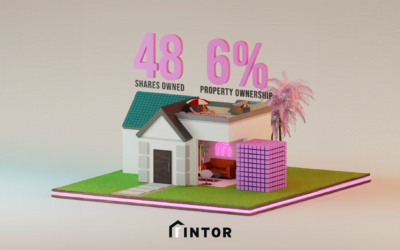One of the most influential investors in the world, Warren Buffet, has a $117 billion dollar net worth and exclusively invests in the stock market. On the other hand, Donald Bren has a net worth of $17.41 billion, making him the richest real estate investor in the U.S. He solely invests in real estate.
It’s obvious that wealth can be made completely in a single asset class, but what is the best course of action for a new investor? Should you invest in the stock market or in real estate?
Stock is a great asset class because:
Stock is easily liquidated–meaning, you can sell stock and get your money out of the investment very quickly.
● Buying stock has a low transaction cost.
● Your employer may offer 401(k) matches that can then be used to purchase stock.
● It’s low-effort to invest in stocks. For example, you can potentially enjoy an average of
11.88% returns on your investments in the S&P 500 index alone.
Real estate is also an amazing asset class because:
Real estate investments can actually hedge against inflation.
● Properties that are rented out to tenants can bring in a monthly passive income (after
you’ve applied the 50/50 rule, of course).
● Real estate is relatively easy to learn when compared to investing in stocks. When you
invest in stocks, you need to understand the nature of the businesses you’re investing in.
Real estate, on the other hand, only requires investors to know a few key strategies to get started.
● Investing in real estate can provide much more leverage. For example, you can purchase a house with only 20% of the total cost, then have renters pay off the mortgage. Once you sell, you can make a hefty profit.
Yes, both asset classes provide great benefits, but it’s still prudent for you to select investments according to a few personal factors. Keep on reading to determine if stock or real estate investing is for you.
The first thing you’ll want to consider is your risk tolerance.
Risk Tolerance
Investors can be classified into three overall categories. You can have an aggressive, a moderate, or a conservative risk tolerance.
If you have an aggressive risk tolerance, you are an investor who wants to win big and is willing to lose money for potentially larger returns. Aggressive investors may opt for stock investments over real estate, as stocks are more volatile and can bring in large returns in a short time period.
Investors with a moderate risk tolerance are okay with winning “medium” sized returns, as long as it means they do not lose too much initial capital. Moderate investors may favor real estate investments as they provide good returns, but are less volatile than stocks.
Conservative investors avoid volatility like the plague. They want highly liquid assets, and they’ll choose investments that provide smaller returns in order to minimize losses.
The biggest piece of advice from Warren Buffet is to “invest in what you know…and nothing more.” The asset class you select should be determined by what you understand and have researched extensively. Once you understand something fully, you can afford to be a bit more aggressive in your investment strategy.
But, you should also consider your time horizon.
Time Horizon
Your time horizon is the amount of time between NOW and the age in which you would like to retire. If you’re currently 20 years old, your time horizon is much longer than someone who is, say, in their sixties.
The longer your time horizon, the more aggressive you can be in your investments. As you age, you’ll move closer to the conservative side of the spectrum. Switching out assets with high volatility in exchange for assets with lower, yet consistent returns is the natural evolution of most Investors.
Real estate requires a longer time horizon to recoup initial investments and returns. Stock, if you know the businesses well, can potentially provide returns more quickly. Therefore, your time horizon absolutely plays a part in your decision to invest in real estate or stock.
Also, your personal financial goals and lifestyle will factor into your decision to invest solely in stock or in the real estate market.
Goals
Some of the biggest factors that determine your investment strategy are your investing goals and personal lifestyle.
Take your income as an example. If you make a large income, real estate investing may be a great option. To invest in real estate, initial capital is usually required for down payments and
maintenance costs. If you have a smaller income, investing in the stock market might make more sense. Fortunately, you can still invest in Real Estate Investment Trusts (REITs) or fractional investments. Though you may not be able to purchase an entire property at this moment, this asset class is not entirely out of reach. Another example could be your goal to grow a family in the next few years. Growing a family comes with added stresses and emergency expenses. Stocks, REITs, or fractional real estate investments might be a great choice for your lifestyle if you do not have the on-hand capital or time to manage a portfolio of properties.
Conclusion
Every individual’s goals are different, and the choice between stock and real estate isn’t cut and dry. With the many considerations and personal factors that ultimately determine your investing strategy, this may require a lot more soul searching and research.
Though there isn’t a straightforward answer, the good news is that you can always do both!
Diversifying your portfolio with both stock investments and real estate properties is a great strategy, and allows you to find the asset class that you prefer.
Getting started by investing in REITs and fractional real estate is a beneficial way to create passive income while learning about real estate investing.
Fintor allows you to purchase Initial Realty Offerings (IROs), also known as shares of a real estate asset. You can begin investing in Fintor with as little as $500 dollars. Today, real estate investing is accessible to new and experienced investors alike.
Invest with Fintor today and get the best of both worlds!



